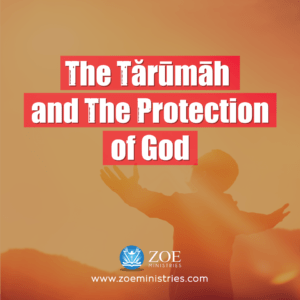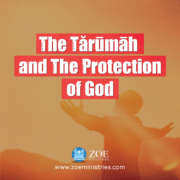The Tărūmāh and The Protection of God:
“With time you can learn where to go for nourishment, where to hide for protection, where to turn for guidance. Just as your earthly house is a place of refuge, so God’s house is a place of peace.”
– Max Lucado
No testing has overtaken you that is not common to everyone. God is faithful, and he will not let you be tested beyond your strength, but with the testing, he will also provide the way out so that you may be able to endure it.
1 Corinthians 10:13 NRSV
Exodus 30 shows us another interesting purpose for the offering and how it is made for atonement. It is an offering that is used to save people’s lives. First, let’s examine the passage below:
11 Then the Lord spoke to Moses. He said, 12 “Make a list of the Israelites and count them. When you do, each one must pay the Lord for his life at the time he is counted. Then a plague will not come on them when you count them.
13 Each one counted must pay a fifth of an ounce of silver. It must be weighed out in keeping with the standard weights that are used in the sacred tent. The payment is an offering to the Lord.
14 Each one counted must be 20 years old or more. He must give an offering to the Lord.
15 When you make the offering, rich people must not give more than a fifth of an ounce of silver. And poor people must not give less. The offering you give to the Lord will pay for your lives.
16 Receive the money from the people of Israel. Use it for any purpose in the tent of meeting. It will remind the people that they are paying me for their lives.” (Exodus 30:11-16)
The context of the passage above took place at the numbering of people for the purpose of enrolling them in the arm of Jehovah (Num. 1:3, Exo. 7:4, 12:41). Everyone who passed over to those that were numbered was to pay half a shekel to the sanctuary as atonement money. Both the rich and the poor paid the same amount 1/5 of an ounce of silver.
Both the rich and the poor both paid the same amount 1/5 of an ounce of silver.
We are all equal in the sight of Jehovah. This payment was to be a târumah (Exo. 25:2) for Jehovah for the expiation of souls.
If we relate it to today’s context, the tithes are the same for both the rich and the poor, it is the first 10%. In terms of the târumah, it is 1/40th for the generous person.
The shekel of the sanctuary, which contained 20 s, can be considered as the original shekel of full weight. There was a lighter shekel which was currently in ordinary use. The sacred shekel, according to the present valuation is worth 26 groschens. One Euro is equivalent to 13.76 groschens. In dollar former, one sacred shekel is about $2.14.
During this time, it was a huge task to take a census. However, this is what Israel will undergo. If you have ever done an inventory, you know that the only one who can order this is the one in authority. Only the person who owns whatever is counted can order an inventory. We only have the authority to count things that are rightfully ours. We cannot put our numbers on other people’s stuff. The census declares that the Israelites who were numbered are God’s.
They were His people, and He alone had the authority to count them.
Who had the right to number the Israelites? It was only God who has the authority to do this. They were His people, and He alone had the authority to count them. According to the commentary of A. W. Pink “When God numbers or orders anything to be numbered, taking the sum of them denotes that they belong to Him and that He has the sovereign right to do with them as He pleases. The action itself says of the things numbered, ‘These are Mine, and I assign them their place as I will.” The only way to properly count the Israelites was for God’s glory alone.
There is a risk that whenever the Israelites took a census, they are in danger of forgetting this. After all, they are the ones physically doing the counting. Thus, they would be tempted to think that their great numbers were a credit to them, rather than to God. They would be tempted to think that their great numbers were a credit to them, rather than to God. It’s not a sin to take a census, but it is a sin to rob God of His glory.
They would be tempted to think that their great numbers were a credit to them, rather than to God.
King David experienced this downfall. He started saying and feeling pride about how big his army was, without attributing its number to the Lord. David got caught up in the numbers game. This boasting can be a temptation for everyone, even a temptation for churches. Pastors always want to see the latest church attendance figures, especially based on the tithes and offering. This information is indeed useful since we want to measure if what we are doing is productive. However, we cannot use it to keep score and to compare our ministry with that of another senior pastor. We are not in a competition. We are on the same team, with the desire to advance God’s Kingdom.
In this context, to make sure the Israelites remembered that they did not belong to themselves but to God, God required a târumah. He required a ransom for every man in Israel. By paying half a shekel, they were acknowledging that they did not belong to themselves, but to God. In the same way, our tithes and offering declare that we belong to the Lord, and we (as well as our finances) are therefore protected.
In the same way, our tithes and offering declare that we belong to the Lord, and we (as well as our finances) are therefore protected.
Your weekly dose of prophetic wisdom and anointing awaits you. Join our LIVE Conference Call!
1) Call 515-604-9266
2) Go to startmeeting.com, and use the login: BishopJordan





